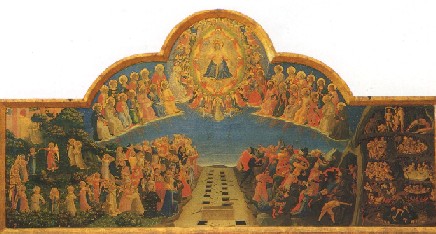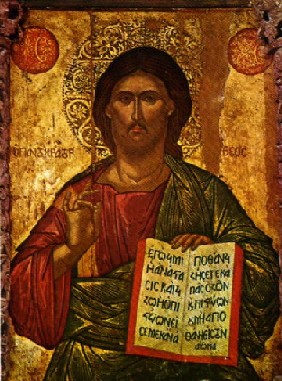THE SOLEMNITY OF OUR LORD JESUS CHRIST
THE KING
Thirty-Fourth
or Last Sunday in Ordinary Time
(only
text, to print)
 INTRODUCTION
INTRODUCTION
We celebrate, today, on finishing the liturgical year, the solemnity of Christ,
the King. It is one of the most important celebrations of the year. Throughout
the year we have contemplated different aspects of Jesus: teacher, Lord,
friend, Son of God, etc. Now, at the end of the year, the Church wants us to
keep in mind the lively image of Jesus as King.
We can easily imagine the context of the gospel we have just heard.
Condemnation of Jesus
Jesus, after being condemned to death by the chief priests of the Jewish people,
is presented to Pontius Pilate, so that he may confirm his death sentence,
since they could not fulfil it without the consent of the Roman Procurator, in
this case of Pontius Pilate.
The priests had condemned him to death because Jesus claimed to be the Son of
God, the Messiah, and the destroyer of the Temple of Jerusalem. Before Pilate,
the accusation they present is that he goes against Rome, that he wants to
become king and that he causes the multitudes to revolt.
The accusation before the Sanhedrin is religious: he claims to be the Messiah,
God. Before Pilate, the accusation is political: he wants to become king;
therefore, he goes against the Caesar.
Jesus, tied and alone, is interrogated by Pilate, if He is truly King. The
answer of Jesus is clear: I am King, for
this reason I have come into the world, to be King, but my kingdom is not of
this world (see: Jhn18:35-37).
Jesus, before the Sanhedrin, affirms that he is God and before Pilate, that he is
king. He does not hide the truth; for this reason he is condemned to death.
Details of the condemnation of Jesus
Jesus before the Sanhedrin
Judas indicated, in the Mount of Olives, who Jesus was; then they took him and led
him to the house of Caiaphas, who was the high priest. He summoned the
Sanhedrin; they were looking for an argument to condemn Jesus. Then two
witnesses rose accusing him of wanting to destroy the temple, but Jesus was
silent. Finally, Caiaphas rose and said to him: "I order you to tell us under oath before the living God whether
you are the Messiah, the Son of God." Jesus said to him in reply,
"You have said so. But I tell you: From now on you will see 'the Son of
Man seated at the right hand of the Power' and 'coming on the clouds of
heaven.'" Then the high priest
tore his robes and said, "He has blasphemed! What further need have we of
witnesses? You have now heard the blasphemy; what is your opinion?" They
said in reply, "He deserves to die!" (Mt 26:62-66).
Pilate tries, four times, to release Jesus
Pilate said to the chief priests and to the people: "I find this man not guilty" (Lk 23:4).
Later: "You brought this
man to me and accused him of inciting the people to revolt. I have conducted my
investigation in your presence and have not found this man guilty of the
charges you have brought against him” (Lk 23:14).
Again Pilate addressed them, still
wishing to release Jesus (Lk 23:20).
Pilate addressed them a third time,
"What evil has this man done? I found him guilty of no capital crime.
Therefore I shall have him flogged and then release him" (Lk 23:22).
Titles of Jesus to declare himself to be king
Jesus, which are your titles, so that we may believe that you are our King?
Jesus is king because he is:
1. God.
Saint Paul writes to the Colossians:
He is the image of the invisible God,
the firstborn of all creation. For in him were created all things in heaven and
on earth … all things were created through him and for him (Col 1:15-17).
Jesus is king, because he is our God. Along with the Father and the Holy Spirit,
he is the creator of all things, visible and invisible.
2, Son of God.
Jesus is king because he is the Son of God. The Father has given the world to
him as inheritance, as the letter to the Hebrews tells us: He occupies a place
superior to the angels and is heir of a much more excellent name than theirs.
As far superior to the angels as the
name he has inherited is more excellent than theirs (Heb 1:2-5).
 3. Redeemer
3. Redeemer
By his blood, we have obtained redemption and forgiveness of our sins. In him we have redemption by his blood (Eph
1:7).
And, finally, Jesus is king, because he has redeemed us, by dying on a cross. Saint
Peter tells us that we have been redeemed not with gold or silver, but with the
blood of Jesus Christ: Realizing that
you were ransomed … not with perishable things like silver or gold but with the
precious blood of Christ (1Pe 1,18-19).
The message of our King
What is the message of Jesus as King?
The message of Jesus as King is the message of the Beatitudes. Blessed are the
poor, those who mourn, the humble, those hunger and thirst for justice, the
compassionate, the pure of heart, those who work for peace, the persecuted;
theirs is the Kingdom of heaven (see Mt 5:3-10).
The Kingdom of Christ
How is his Kingdom? As the Preface says, it is a Kingdom of truth and life,
sanctity and grace, justice, love and peace.
Practical consequence
Jesus is our King, and we have to establish his Kingdom among men.
Our mission is the same one of Jesus: to bring truth where there is falsehood,
life where there is death, holiness where there is corruption, justice where
there is injustice, peace where there is discord.
As Saint
Francis of Assisi teaches us:
Lord, make me an instrument of your peace;
where there is hatred, let me sow love;
when there is injury, pardon;
where there is doubt, faith;
where there is despair, hope;
where there is darkness, light;
and where there is sadness, joy.
Grant that I may not so much seek
to be consoled as to console;
to be understood, as to understand,
to be loved as to love;
for it is in giving that we receive,
it is in pardoning that we are pardoned,
and it is in dying [to ourselves] that we are born to eternal life.
Our
mission is not easy, but I can do all things in Him who strengthens me, as Saint
Paul said (Philippians 4:13).
DIVERSITY OF OPINIONS, AMONG CHRISTIANS, ON EARTHLY THINGS
It is necessary to bear in mind that the Church does not impose any opinion on
this matter on Christians involved in earthly things; but it reminds them of
the need to form an opinion in the light of faith.
The diversity of options and opinions, on the part of believers, on temporal,
social and political matters, is legitimate. Experience shows us that there are
Christians in different political parties, but, as Pope Paul VI reminded us,
their opinions can never be based on ideological systems that are radically, or
in the essential points, against their faith or their conception of man.
The world is in such a bad state because people do not want to recognize Jesus as
king. Jesus, and his message of peace and love, is the only one who can fix
this so deranged world.
Our task is to make Him known, and work so that his kingdom really comes to us,
as we say so often in the prayer of the Our Father, that Jesus himself taught us: Your Kingdom
come (Mt 6:10).
May you have a good Sunday of Christ, the King.